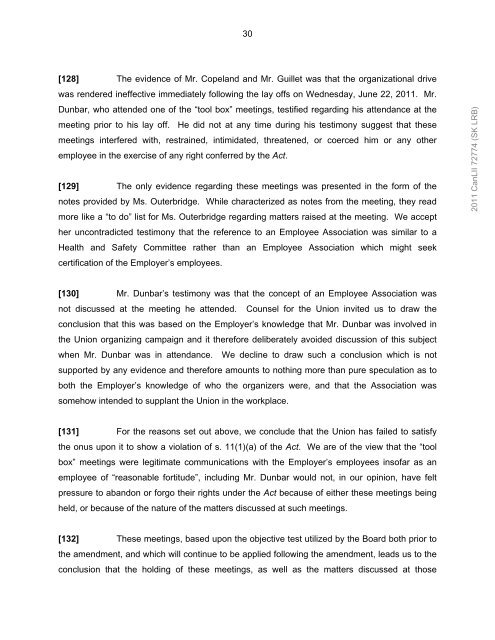FAQ's Cases - Stewart McKelvey
FAQ's Cases - Stewart McKelvey
FAQ's Cases - Stewart McKelvey
- No tags were found...
Create successful ePaper yourself
Turn your PDF publications into a flip-book with our unique Google optimized e-Paper software.
30[128] The evidence of Mr. Copeland and Mr. Guillet was that the organizational drivewas rendered ineffective immediately following the lay offs on Wednesday, June 22, 2011. Mr.Dunbar, who attended one of the “tool box” meetings, testified regarding his attendance at themeeting prior to his lay off. He did not at any time during his testimony suggest that thesemeetings interfered with, restrained, intimidated, threatened, or coerced him or any otheremployee in the exercise of any right conferred by the Act.[129] The only evidence regarding these meetings was presented in the form of thenotes provided by Ms. Outerbridge. While characterized as notes from the meeting, they readmore like a “to do” list for Ms. Outerbridge regarding matters raised at the meeting. We accepther uncontradicted testimony that the reference to an Employee Association was similar to aHealth and Safety Committee rather than an Employee Association which might seekcertification of the Employer’s employees.2011 CanLII 72774 (SK LRB)[130] Mr. Dunbar’s testimony was that the concept of an Employee Association wasnot discussed at the meeting he attended. Counsel for the Union invited us to draw theconclusion that this was based on the Employer’s knowledge that Mr. Dunbar was involved inthe Union organizing campaign and it therefore deliberately avoided discussion of this subjectwhen Mr. Dunbar was in attendance. We decline to draw such a conclusion which is notsupported by any evidence and therefore amounts to nothing more than pure speculation as toboth the Employer’s knowledge of who the organizers were, and that the Association wassomehow intended to supplant the Union in the workplace.[131] For the reasons set out above, we conclude that the Union has failed to satisfythe onus upon it to show a violation of s. 11(1)(a) of the Act. We are of the view that the “toolbox” meetings were legitimate communications with the Employer’s employees insofar as anemployee of “reasonable fortitude”, including Mr. Dunbar would not, in our opinion, have feltpressure to abandon or forgo their rights under the Act because of either these meetings beingheld, or because of the nature of the matters discussed at such meetings.[132] These meetings, based upon the objective test utilized by the Board both prior tothe amendment, and which will continue to be applied following the amendment, leads us to theconclusion that the holding of these meetings, as well as the matters discussed at those
















